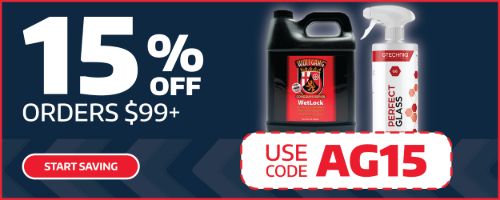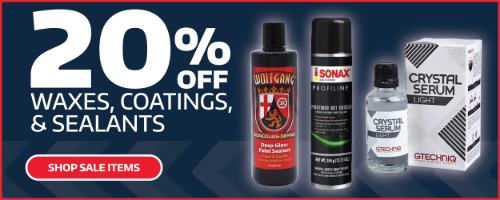Step 2 in the lens clarifying process!
Wolfgang Plastik Lens Glaze works like a finishing polish to restore perfect clarity and smoothness to polished headlight lenses. It can also be used as a single-step plastic polish for clear vinyl, visors, and windscreens. Its ultra fine abrasives leave restored headlights looking nearly new! Wolfgang Plastik Lens Glaze is step two in the Wolfgang Plastik Lens Cleaning System.
Wolfgang Plastik Lens Glaze is step 2 in the lens cleaning system. It is a fine grade finishing polish that perfects the lens surface after it has been repaired with Wolfgang Plastik Lens Cleaner. Just like a paint glaze, Wolfgang Plastik Lens Glaze has mild cleaning properties but contains no abrasives. It removes any roughness or haze caused by the abrasive action of the lens cleaner and restores the optical clarity and smoothness. Though you will see an improvement after polishing the lens, you need Lens Glaze to see the complete results of your work.
Most auto manufacturers now use polycarbonate headlight lenses on their vehicles. Window grade polycarbonate is perfectly clear and highly impact resistant. It's "soft" compared to many other rigid plastics, which allows it to bounce back from considerable impact. This softness also allows it to be polished to correct scratches and cloudiness. You can imagine that it takes an aggressive polish to penetrate plastic, so the initial results may appear rougher than you'd like. To restore the smoothness and optical clarity of the lens, use Wolfgang Plastik Lens Glaze.
Your lenses will show a drastic improvement in cleanliness and optical clarity. Wolfgang Plastik Lens Glaze can also be used to clean and clarify motorcycle windshields and clear vinyl windows on convertible tops. The gentle formula will not scratch these surfaces as it removes cloudiness, yellowing, creases, and scratches. Many people replace their convertible tops after a few years because they become yellow and dingy. Save yourself several hundred dollars by using Wolfgang Plastik Lens Glaze!
Likewise, replacing headlight lens covers can cost in the neighborhood of $500. By using the Wolfgang system, you save all that money and you still get the appearance of new or nearly new lenses!
Apply Wolfgang Plastik Lens Glaze using a 4" gray pad adapted to your cordless or electric drill.
If using a cordless drill, work at the highest speed. If using an electric drill, use the lowest setting.
You may also use your circular or dual action polisher adapted to a 4" pad. Set the maximum speed on a dual action polisher at 5000 OPM. Set your circular polisher at no greater than 1500 RPM. Polish until the glaze starts to dry. Buff away the residue with a microfiber towel.
After you've completed restored your lenses, seal in the shine and clarity with Wolfgang Plastik Surface Sealant. It will prevent future damage and maintain the transparency of the lenses.
Try Wolfgang Plastik Lens Glaze as part of the Wolfgang Lens Cleaning System and you'll see a clear difference.
Motorcycles:
Wolfgang Plastik Lens Glaze is recommended for motorcycle windshields, visors, or clear vinyl windows. The gentle formula will not scratch these surfaces as it removes cloudiness, yellowing, creases, and scratches.
You can use the complete system on motorcycle headlights.
Convertible Top Windows:
1. Use the Wolfgang Plastik Lens Glaze to gently remove scratches and cloudiness.
2. Then apply Plastik Surface Sealant to protect the vinyl from future damage.
Clean Up:
1. Toss your used pads in a solution of DP Polishing Pad Rejuvenator and water.
2. Dilute one scoop per 3-4 gallons of water.
3. You can cut the solution in half if you've only got these two pads to clean.
4. Let them soak for 15 minutes and then rinse thoroughly.
5. Let them air dry.
product reviews
Shipping
Free shipping is automatically applied for orders $149+
*Some oversized or heavy items may not qualify. View full details.
See our Shipping FAQ for more information.
Returns
We offer returns for 30 days after your order date.
Some restrictions apply. See our Returns Policy for more information.






